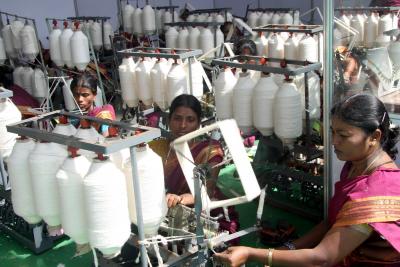By Anand Singh
New Delhi, Jan 17 : Giving a major thrust to the government’s ambitious Aatmanirbhar Bharat Abhiyan, the Tribal Affairs Ministry is all set to sign two MoUs with the Khadi and Village Industries Commission (KVIC) for procurement of Khadi fabric for tribal students and for partnering with KVIC in implementing the flagship employment generation scheme – Prime Minister’s Employment Generation Programme (PMEGP).
The ministry will purchase over 6 lakh metres of Khadi fabric worth nearly Rs 15 crore for uniforms of tribal students studying in Eklavya residential schools across the country.
As part of the second MoU, National Scheduled Tribe Finance Development Corporation (NSTFDC), an agency of the Tribal Affairs Ministry, will be roped in as KVIC’s partner in implementing PMEGP scheme. NSTFDC is an agency that provides concessional loan schemes for economic development of tribals in India for funding entrepreneurial ventures of aspiring scheduled tribes in all sectors of the economy.
A Tribal Affairs Ministry source related to development said that the two MoUs will be signed later this week.
The MoUs are in line with the government’s Aatmanirbhar Bharat Abhiyan by creating local and self employment for Khadi artisans and the tribals. The huge purchase of Khadi fabric will create additional employment and income for artisans, a government official said. Similarly, roping in the Tribal Affairs Ministry with PMEGP will increase its ambit and also include more entrepreneurs from the ST community with local manufacturing.
Officials said the first MoU for purchase of Khadi fabric will be between NESTS and KVIC while the other one one will be between NSTFDC and KVIC.
The source said that the Tribal Affairs Ministry, which runs Eklavya residential schools where at present 75,000 students are studying, proposes to establish a total of 750 schools by 2022. He said that with 750 more schools, a total of 3.6 lakh students will be enrolled in these schools, which has been envisioned by Prime Minister Narendra Modi.
The source said that each school will have 480 students.
He further explained that the ministry has recently standardised school uniform design for the students in the schools with a distinct logo in partnership with National Institute of Fashion Technology (NIFT) based in New Delhi.
The source said that keeping in view the focus of the government and the call of the Prime Minister to embrace Khadi as a philosophy and recently as a critical component of the Aatmanirbhar Bharat strategy, the Tribal Affairs Ministry felt it appropriate to source the fabric for uniforms of Eklavya residential schools from KVIC after several rounds of discussions.
He said that current requirement of around 6 lakh metres will increase in subsequent years as enrolment in the schools will go up.
“In order to take this forward, the Ministry through NESTS shall be entering into an MoU for procuring the fabric at an approximate cost of Rs 14.77 crore for 2020-21.”
The source further said that as two dresses are given each year and number of students will increase every year with establishment of new schools, this would be an annual affair and procurement is likely to multiply every year and expected to be of Rs 50 crore by 2022.
He also said that it would not only give quality dress material to the students but also give employment to thousand of artisans and workers across the country.
The source said that based on the success of school uniform initiative, other requirements of schools like bedding, towels, ‘dari’, and others can also be procured from KVIC in future.
“Therefore the proposed MoU between NSTFDC and KVIC will formalise this arrangement and will be a landmark initiative to bring synergy between NSTFDC and KVIC in reaching out to tribal entrepreneurs under the larger ambit of PMEGP scheme,” the source added.
The source further said that the MoU will be signed in presence of Union ministers Nitin Gadkari and Arjun Munda.
(Anand Singh can be contacted at anand.s@ians.in)
Disclaimer: This story is auto-generated from IANS service.

